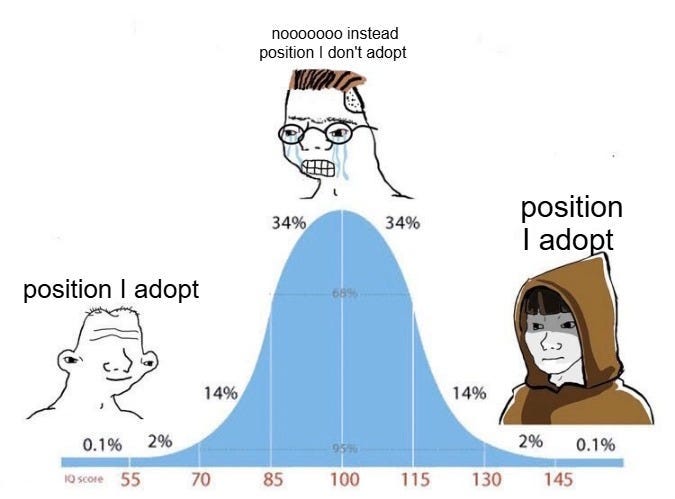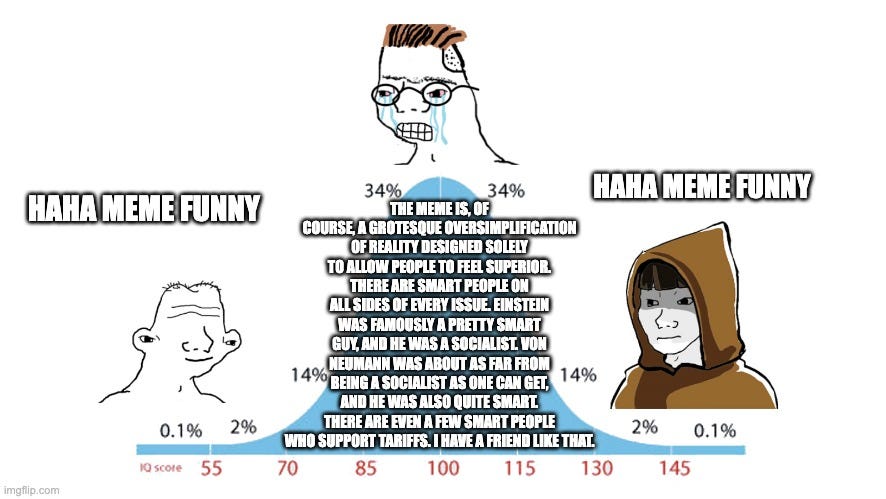In a recent post titled The Memefication of Thought (it’s a good post and you should read it),
railed against the modern tendency to dismiss serious arguments with inane memes so as to avoid thinking about it. He had some pretty good memes of his own, such as the classic Swole Doge vs. Cheems:and a variant on the Soyjacks vs Chads:
I would also like to submit what I believe to be the progenitor of this entire class of internet meme, Virgin vs. Chad:
But Bentham views these memes as more than just funny jokes. He thinks that
the memefication of public discourse has been devastatingly corrosive to the quality of public rationality. And the public was never that rational to begin with!
He then goes on to discuss an old Scott Alexander post on a related subject, social justice warrior bingo cards, and references his own post called “Against The Dunkers”.
I’m sympathetic to the motivations behind his argument. I also wish that public discourse was more rational, I’m not a huge fan of dunking (it is very funny and entertaining, but it’s usually too malicious for my liking), and I think that memes like these are often wielded as weapons against being forced to engage with arguments similar to the bingo card effect that Alexander criticizes:
Let's look at the fourth one, "Anti-Zionist Bingo." Say that you mention something bad Israel is doing, someone else accuses you of being anti-Semitic, and you correct them that no, not all criticism of Israel is necessarily anti-Semitic and you're worried about the increasing tendency to spin it that way.
And they say "Hahahahahhaa he totally did it, he used the 'all criticism of Israel gets labeled anti-Semitic' argument, people totally use that as a real argument hahahaha they really are that stupid, I get 'B1' on my stupid stereotypical critics of Israel bingo!"
You say "Uh, look, I'm not really sure what you're getting at. I recognize that there is real anti-Semitism and I am just as opposed to it as you are but surely when when see the state excusing acts of violence against Palestinians in the West Bank we..."
And they say "Hahahhaha G1, I got G1, he pulled the old 'I abhor real anti-Semitism' line this is great, guys come over here and look at what this guy is doing he's just totally parroting all the old arguments every anti-Semite uses!"So it may be scary when your opponent is unaware of your arguments, but it is much scarier when your opponent has a sort of vague dreamlike awareness of your arguments, which immediately pattern-match cached thoughts about how horrible a person you would have to be to make them.
Scott’s ultimate worry—and Bentham’s argument—follow from an intuitive premise: these memes and bingo cards themselves are not just symptoms of poor rationality but causes in and of themselves. Scott’s worry is not that the bingo card can be used to deny any argument: he worries that the bingo might get someone to deny every argument.
the scariest thing would be if one of those bingo cards had, in the free space in the middle: "You are just pattern-matching my responses. I swear that I have something legitimate to tell you which is not just a rehash of the straw-man arguments you've heard before, so please just keep an open mind and hear me out."
If someone did that, even Origen would have to admit they were beyond any hope of salvation. Any conceivable attempt to explain their error would be met with a "Hahahaha he did the 'stop-pattern matching I'm not a strawman I'm not an inhuman monster STOP FILLING OUT YOUR DAMN BINGO CARD' thing again! He's so hilarious, just like all those other 'stop-pattern matching I am not a strawman' people whom we know only say that because they are inhuman monsters!"
If you read the title, you’ve probably guessed that I don’t really buy this argument. Let me explain.
If someone wants to use a thought terminating cliché, they’re gonna find one
Wikipedia says
A thought-terminating cliché (also known as a semantic stop-sign, a thought-stopper, bumper sticker logic, or cliché thinking) is a form of loaded language—often passing as folk wisdom—intended to end an argument and quell cognitive dissonance with a cliché rather than a point.
If you need some examples of thought-terminating clichés, imagine a Christian that dismisses all arguments against Christianity by saying that “God works in mysterious ways”, an Atheist who dismisses Theists by saying “I don’t take sky daddy believers seriously”, or a Leftist who dismisses any argument about market efficiency/improving government services by saying “typical neoliberal shill.”
(Yes, I am going to be writing about the discourse around Abundance at some point, because it’s ticking me off. Also, never let it be said that I punch down—I also punch at myself, a Leftist Atheist!)
Anyways.
These types of clichés are annoying, and for good reason. They are the clearest indications that someone is not going to take anything you say seriously because they are infected with what Bentham calls a “mind virus” (I don’t really like using this term but oh well).
Where I disagree with Bentham (and Scott) is that the mind virus comes in the form of the meme, bingo card, or cliché. As the Wikipedia definition pointed out, the point of a thought-terminating cliché is not to infect people with worse epistemic hygiene, but to relieve cognitive dissonance from the mind.
People who use thought-terminating clichés aren’t making their epistemics worse; they’re trying to find a relieving salve for a worldview or belief that is important to them. They’re trying to defend their ego and self-conception against an attack from the outside world—indeed, that’s what the ego is for!—and part of doing so means finding like-minded people so that they can form an in-group and insulate themselves from further challenge by pushing others into an outgroup. Memes are not what cause this phenomenon.
Ironically, Bentham undermines his own point by bringing up the spat he had with another poster, Kitten. As you can see in the comments section of that article, they briefly fight about the validity of Bentham’s complaints about Kitten dunking on his views and refusing to engage in proper argument. Kitten says this:
I continue to find this very funny and I won't be made to feel bad about it.
Consider: what you are describing as mockery was me posting two screenshots of essays you yourself wrote, and a picture of your face currently on the front page of your substack publication. My entire commentary was limited to "Checking in on the rationalists." That's it! That's the dunk!
The reason it was a dunk is because this content is self-ridiculing. I didn't even need to explicitly mock it, just calling attention to it was enough for over 1,600 readers as of the time of this writing to come to their own conclusion about its absurdity.
Also by your own logic, since I have 20x as many followers as you on twitter, you should be thanking me for the exposure. Happy to help any time.
In this block quote, you can see that the man simply does not want to argue. He doesn’t need a meme, he doesn’t use a bingo card, and he doesn’t even use a thought-terminating cliché. There is literally no loaded language here and no rhetoric (except for the attempted dunk at the end, which is just kind of lame. Sorry Kitten). There is no symptom to point to, no symbol of the modern degradation of public discourse.
Instead, Kitten simply says outright that he refuses to engage in argument.
I don’t even think Kitten is trying to defend his ego here. If you want more context, you can read the comments section of that article. The point I’m making is that the meme is clearly not causative of “dunking”-type behavior. Even without the outward-facing meme, it’s the ego-forward status-seeking drive that motivates the degrading of public discourse. Removing the tools that people use to avoid cognitive dissonance won’t stop the dissonance—the discomfort is still there, so they’ll just find new tools to relieve it.
Besides, people used thought-terminating clichés long before the advent of the internet or the bingo card. And the desire to dunk on your opponents is as old as argument itself.
The oldest dunkers in the world
The oldest dunk I can think of right now comes from the Spartans, who were famous for their witty one-liners. Indeed, the “Laconic phrase,” defined by Wikipedia as “a concise or terse statement, especially a blunt and elliptical rejoinder,1” was literally named after Laconia, the region of Greece that included the city of Sparta. Wikipedia’s account of the classic laconic phrase goes as follows:
A prominent example of a laconism involving Philip II of Macedon was reported by the historian Plutarch. After invading southern Greece and receiving the submission of other key city-states, Philip turned his attention to Sparta and asked menacingly whether he should come as friend or foe. The reply was "Neither."
Losing patience, he sent the message:
“If I invade Laconia, I shall turn you out.”
The Spartan ephors again replied with a single word:
“If.”
Philip proceeded to invade Laconia, devastate much of it, and eject the Spartans from various parts.
See what I mean? This anecdote has everything we associate with “dunking”, even the part where the “dunker” gets their teeth kicked in despite trying to sound cool.
But perhaps the true classic dunk comes from the eternal Diogenes the Cynic, who absolutely shat on Plato that one time. This excellent comment on r/AskHistorians summarizes the classic story, and I’d highly recommend reading it if you’re at all curious.
As per the the translation on Perseus:
Plato had defined Man as an animal, biped and featherless, and was applauded. Diogenes plucked a fowl and brought it into the lecture-room with the words, "Here is Plato's man." In consequence of which there was added to the definition, "having broad nails." To one who asked what was the proper time for lunch, he said, "If a rich man, when you will; if a poor man, when you can."
This burn was so painful that it has survived thousands of years, and once again found a foothold in the modern internet era. Know Your Meme even has a page on Plato’s Man:
Plato's Man refers to a tongue-in-cheek definition of man as a "featherless biped" given by the Ancient Greek philosopher Plato. Upon learning of that, philosopher Diogenes then plucked a chicken and brought it into Plato's Academy, saying, "Behold! I've brought you a man." In the late 2010s, Plato's definition of man became a subject of memes, first within the larger Diogenes Posting trend and then independently, with users sharing photographs of various two-legged, featherless objects and creatures, stating that they should be considered a man.
Diogenes Posting. Isn’t that so beautiful? From Know Your Meme,
Diogenes Posting refers to the practice of posting greentext stories and memes about Ancient Greek philosopher Diogenes, often presenting him as the original shitposter and a troll. Originating on 4chan, the trend later spread to Tumblr, Reddit and other online platforms.
If you want to read more about this, you should read more of the Diogenes stories, because this guy is full of witty one-liners.
One of my favorites is the story of when Diogenes met Alexander the Great. As my favorite version of the story goes, Alexander once visited Corinth, receiving the greetings and praise of many philosophers and statesmen. Diogenes didn’t give a shit. Curious, Alexander went to see him, asking him if he wanted anything.
"Yes," said Diogenes, "stand a little out of my sun."
Alexander was struck by this—Diogenes truly did not care about him. He said to Diogenes:
"But truly, if I were not Alexander, I wish I were Diogenes."
Diogenes responded:
“If I were not Diogenes, I would also want to be Diogenes.”
I’m not sure how much of this is apocryphal—the last line was likely made up after the fact, which is sad because it rules. But I digress. The point is, the “dunking” meme is simply the modern manifestation of the desire to dunk on people. And that desire has been around forever.
It’s not impossible that memes make public discourse worse by constantly exposing people to thought-terminating clichés and encouraging people to format the cliché of their choice into an easily spreadable format. But I wouldn’t blame this on the memes themselves, and instead blame the social media platforms and the modern technological engagement algorithms that encourage ragebait and farming likes. Once again, the “dunking” memes are simply the manifested symptom of a system or society that encourages dunking. I think it’s a little unfair to blame the meme for this.2
Another classic image is the following.
I can’t find a source for this, so it might be a modern spoof. But honestly, I hope it’s not EDIT: thank you to Dirk from LessWrong, who found the original source! It came from Kate Parry Frye’s Suffrage Diary all the way back in 1907.
The virgin vs chad meme has been around forever, and public discourse has had an appetite for this sort of dunking forever.
But, there’s more. I personally really love memes, and I’m going to defend one that I think Bentham picked out unfairly and misunderstood:
The midwit meme
Here’s an example of a midwit meme that I found on Google.
It’s nice when my example meme is something I genuinely believe.3
Bentham’s take on the midwit meme was as follows:
The bellcurve is supposed to be an IQ bell-curve. The core idea of the meme: while there are a lot of really stupid people who adopt your position, and the people who adopt the other position feel superior to those dumbass hicks who have your position, your position is what the REALLY smart people believe. Thus, while acknowledging that the people on your side are mostly subliterate morons who can barely tie their shoes, you still get to feel superior. While your opponents aren’t dumb, they’re midwits who possess middling intelligence. The people on your side are the really intelligent people.
This is pretty uncharitable to the midwit meme (although I don’t blame him for not taking it very seriously). As I said in Bentham’s comments section, the archetypal midwit isn't merely just "guy who has position I disagree with". It's specifically "guy defending the position I disagree with in an intense amount of detail", usually in the format of a stream-of-consciousness monologue that is clearly irrational. In a strange way, it’s approving of the low IQ section of the bell curve; it’s specifically a meme that argues against overthinking.
Know Your Meme has a great page on the midwit meme that summarizes it as such:
The "midwit" meme has been one of the most prominent exploitable images on the internet, which essentially tries to summarize the IQ spectrum from dumbest, average and smartest intelligence, showing that sometimes people engage in overly complex reasoning while individuals at either end of the IQ Bell Curve tend to arrive at similar conclusions, albeit through different rationales.
Sorry Bentham. This one doesn’t really fit the context of your post.
On a more general level, I would like to defend memes against this kind of criticism. Yes, memes are often used to advance stupid and harmful arguments. Memes are also used to criticize those memes—Coaxed Into a Snafu is exactly this kind of ironic self-dunking of people who use memes, and it’s as old as 2012.
Ultimately, my disagreement with Bentham stems from his belief that memes are designed for people to feel superior to others.
This is just not true.
Memes are designed for people to connect with each other, and spread their inside jokes around the world. Yes, sometimes this means that memes are used for dunking or feeling superior to others. This is because memes can possess every possible amalgamation of meaning—and indeed they often do! If you want even more examples, keep looking on the Know Your Meme site—it’s a beautiful catalogue of all the wonderful ways that people interact with each other en masse online.I would also recommend
’s stuff, especially his YouTube channel.Anyway. I can’t explain all of internet culture to you in this short post. It’s a rich tapestry too complicated to reduce downwards. Every corner of the internet has their own memes, and uses them for their own purposes. Explore with an open mind—and don’t fall into the trap of seeing a meme and assuming your opponent is stupid or arguing in bad faith. That’s what we were trying to avoid in the first place!
Give more grace to people. And don’t blame the meme. Blame the…memenger? Memonger?
Truly no idea why Wikipedia thought those links were worth including. I’m gonna leave them in because I think it’s funny.
In the process of writing this post, my roommate
walked into the living room and had a conversation with me that sharpened my thoughts on the topic, so I want to give credit to her for this point. Check out her Substack, Bullish Lemon!










Beautifully written! I love the important nuance that it's really about thought terminating cliches and memes are just one of many possible formats these can take. And also, not every meme is a thought terminating cliche. The midwit meme specifically was a real upgrade for me. "Wait, am I midwitting this right now?" is a valuable question to ask, imo.
I think you’re right that memes are mostly to connect with others. I think people miss this because it mostly happens in the dark forest of the internet.
Nadia asparhouvas new book antimimetics on this is really interesting so far. Reading it now